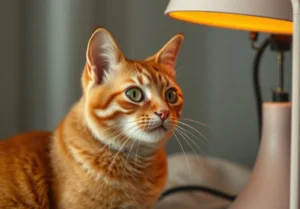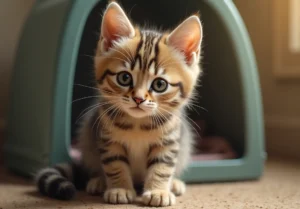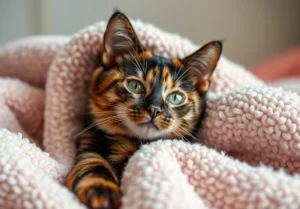Cats seem to have a magical ability to look plumper on colder days, leaving us wondering why this phenomenon occurs. The answer lies in their instinctual behavior to stay warm and cozy in chillier temperatures.
Natural Insulation: Why Cats Seem to Puff Up in the Cold
Have you ever noticed how your cat seems to look a bit chunkier on colder days? Well, there’s a fascinating reason behind that. When the temperature drops, cats instinctively puff up their fur to create a thicker layer of insulation. This extra fluff traps warm air close to their bodies, helping them retain heat more effectively and stay cozy in the chilly weather.
This natural insulation process is like them putting on a warm, fluffy jacket to combat the cold. So, don’t worry if your feline friend appears a bit plumper in the winter – it’s just their clever way of staying warm and comfortable in the face of dropping temperatures.
Increased Appetite: Do Cats Actually Eat More in the Cold?
Contrary to popular belief, cats don’t necessarily eat more in colder weather just to stay warm. While some may experience a slight increase in appetite due to burning more energy to keep themselves warm, it’s not a universal rule. Cats are known for their selective eating habits, so their food intake may not significantly change based on the season.
If your cat does seem to be eating more during the winter, it could be because they are more active indoors or simply seeking more comfort in hearty meals. However, it’s essential to monitor their weight and adjust their diet accordingly to ensure they stay healthy and maintain a stable weight throughout the year. Remember, a balanced diet is key to keeping your furry companion in top shape regardless of the weather.
Extra Tip: Providing your cat with a warm and cozy sleeping spot during the cold months can also help them conserve energy and stay comfortable. Consider investing in a soft, insulated bed or a heated cat mat to keep them snug and content during winter nights.
Check out this resource for more tips on keeping your pet healthy during the winter season.
Lazy Day Syndrome: The Impact of Cold Weather on Cat Activity Levels
Have you ever noticed that your kitty seems to pack on a few extra pounds when the weather turns chilly? Well, you’re not imagining things! Cold weather can actually lead to what I like to call “Lazy Day Syndrome” in cats. When the temperatures drop, our feline friends tend to become less active. Just like humans, cats might not feel like moving around as much when it’s cold outside, preferring to curl up in a warm spot instead. This decrease in activity levels can contribute to their plumper appearance on those chilly days.
It’s essential to keep an eye on your cat’s activity levels during colder weather. Encourage them to play indoors, provide stimulating toys, and create cozy spots where they can bask in the warmth. Keeping your cat engaged and moving can help prevent excessive weight gain during the winter months. Remember, a healthy cat is a happy cat!
Water Retention: Could Cold Weather Cause Cats to Retain More Water?
Did you know that cold weather could potentially cause cats to retain more water in their bodies? This phenomenon might sound surprising, but it could play a role in why your cat looks a little fuller on colder days. When temperatures drop, cats might instinctively drink less water. In response, their bodies could try to hold on to whatever water they do consume, leading to a bloated or fuller appearance.
To combat this, make sure your cat has access to fresh, clean water at all times, regardless of the weather. Consider offering wet food or adding a little water to their meals to help them stay hydrated. Keeping your cat well-hydrated can aid in maintaining their overall health and may help prevent them from appearing more substantial than usual on cold days.
Additional Unique Insight: Nutrition Considerations for Cold Weather
In addition to the impact of decreased activity levels and water retention, it’s crucial to pay attention to your cat’s nutrition during colder months. Just like humans, cats might crave more comfort foods when it’s chilly outside. Be mindful of their calorie intake and opt for high-quality, balanced meals to keep them healthy and at an optimal weight. Consider consulting with your veterinarian for personalized nutrition recommendations tailored to your cat’s needs. A well-rounded diet is key to keeping your feline friend looking and feeling their best all year round.
Behavioral Changes: How Cold Weather Impacts a Cat’s Behavior
When the temperatures drop, cats may exhibit certain behavioral changes that could make them appear fatter. It’s not that they suddenly gained a few pounds overnight, but rather their actions in response to the cold. Cats tend to be less active in colder weather as they conserve energy to stay warm. This reduced physical activity can lead to a perceived increase in weight due to less movement. So, next time you see your cat looking a bit plumper on a chilly day, remember it’s more likely a change in behavior rather than actual weight gain.
Seeking Warmth: The Relationship Between Temperature and Cat Weight
On cold days, cats tend to seek out warm spots to lounge and relax. This could be near a fireplace, a sunny window, or even snuggled up under a blanket. As they curl up in these cozy spots to stay warm, their fur may fluff up, creating the appearance of a larger body size. So, if your cat seems to be bulking up on a cold day, don’t worry – it’s just their natural instinct to seek warmth in the chillier temperatures.
Additional Insight:
– Cats may also eat more during colder weather to generate extra body heat through digestion, which could contribute to the appearance of being a bit larger. Just like us reaching for comfort food on a cold day, our feline friends may do the same to stay warm. So, keep an eye on their food intake during winter months to ensure they maintain a healthy weight.
Mythbusting: Debunking Common Misconceptions About Cat Weight and Cold Weather
Let’s set the record straight: cats may appear fatter on a cold day due to their fur fluffing up to trap heat, giving the illusion of extra bulk. However, this doesn’t necessarily mean they’ve gained weight. The cold weather simply makes their fur look more voluminous, creating a puffy appearance.
Contrary to popular belief, the cold itself doesn’t directly cause cats to gain weight. Instead, it’s important to monitor their diet and exercise routine year-round to ensure they maintain a healthy weight regardless of the temperature outside. Keep your feline friend on a balanced diet and provide opportunities for play and movement to keep them fit and trim.
Remember, a cat’s weight can fluctuate just like a human’s, so don’t be quick to assume that winter weather is solely to blame for any perceived increase in size. Stay vigilant about your cat’s overall health and well-being no matter the season.
Fun Feline Facts: Intriguing Tidbits About Cats and Cold Weather
Snow Paws : Cats have a special adaptation in their paws that helps them navigate snowy terrain. Their paw pads are thick and act as natural snowshoes, allowing them to roam comfortably even in chilly conditions.
Winter Coat : While cats may look puffier in the cold, their thick fur isn’t just for show. It actually serves as insulation, keeping them warm when temperatures drop. This is why grooming is crucial for cats, especially during winter, to maintain a healthy coat.
Heat Seekers : Despite their cozy appearance, cats still seek out warm spots in the winter. Whether it’s a sunny window sill or a heated bed, they are always on the lookout for a place to snuggle up and stay toasty.
Colder Days, Faster Metabolism : Interestingly, cats’ metabolism can increase slightly in colder weather to help them generate more body heat. So, while they may seem lazier in winter, their bodies are actually working harder to keep them warm.
Hydration Reminder : Just because it’s cold outside doesn’t mean your cat doesn’t need water. Make sure to provide fresh water regularly, as staying hydrated is essential for your feline friend’s overall health, no matter the season.
Embrace these fun facts about your furry companion and appreciate their unique adaptations to colder weather!
Alex, a passionate animal lover, has experience in training and understanding animal behavior. As a proud pet parent to two dogs and three cats, he founded AnimalReport.net to share insights from animal experts and expand his knowledge of the animal kingdom.




